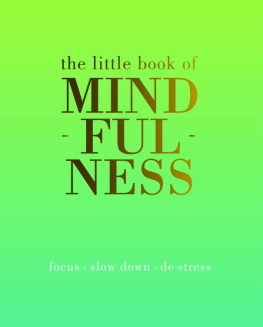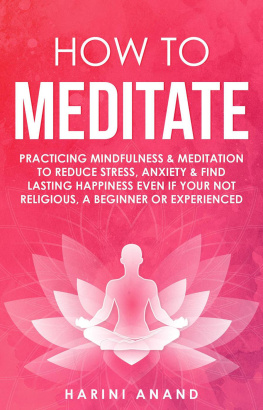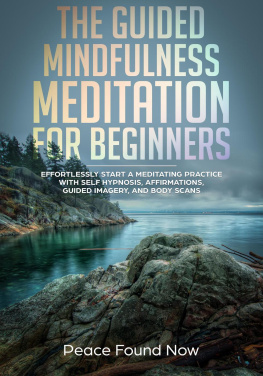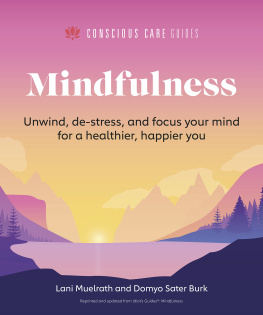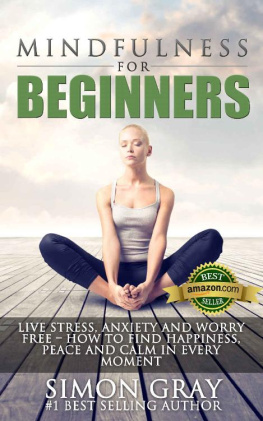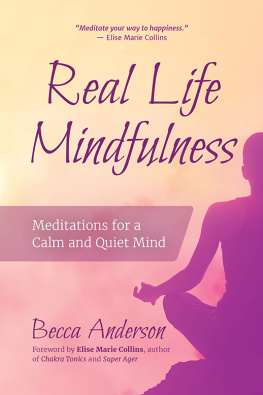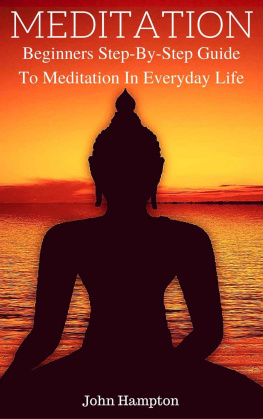When you are on a journey, it is certainly helpful to know where youre going but remember: the only thing that is ultimately real about your journey is the step that you are taking at this moment. Thats all there ever is.
At first, mindfulness can seem like an intangible concept. However, practising mindfulness is, quite simply, the act of concentrating on your breathing, being aware of your breath and being aware of what is going on around you in the present moment. The more you do it, the more the simplicity of it becomes clear and the benefits manifold. It lightens the mind and the spirit.
Mindfulness is a very simple form of meditation that was little known in the West until recently. A typical meditation consists of focusing your full attention on your breath as it flows in and out of your body. Focusing on each breath in this way allows you to observe your thoughts as they arise in your mind and, little by little, to let go of struggling with them.
PROFESSOR MARK WILLIAMS
- Do you tend to get so focused on the goal that you want to achieve that you lose touch with what you are doing right now to get there?
- Do you then rush through activities without being really attentive, to the point that you never quite reach that goal?
Practising mindfulness, creating a mental environment that is harmonious and peaceful, is conducive to clarity of thought.
Being aware with real attention. Strengthen this muscle again and again by using breathing as a constant access, whenever you want or need it.
It is easy to read about the importance of being mindful and then forget about it and not actually apply it. Mindfulness, and all its benefits, will not become apparent until youve really engaged with it. And like everything, it gets better with practice. Even the first time you do the simple breathing technique, really take time out (and were only talking about a few minutes initially) to experience it for yourself the result is immediate. It will empower and encourage you to take another step and then another, until you are being mindful in other activities.
Opening this book at any page will hopefully give you a recipe to remind you of the importance of staying (or more likely returning to) the here and now. Each time you engage with a mindfulness notice and link it to an increasing number of daily activities you reinforce the whole concept.
As you develop this practice it will come to you naturally and you will reap all the benefits. Your spark will return, you will find new enjoyment in simple activities, you will not yearn or crave for something in the future or mourn the undone past, and you will be more relaxed and yet mentally more alert and enthusiastic. Your relationships and communications with people will change. In short this is a pivotal moment right now as youre reading these words to improving and brightening your whole life and outlook.
If you try to calm [the mind], it only makes it worse, but over time it does calm, and when it does, theres room to hear more subtle things thats when your intuition starts to blossom and you start to see things more clearly and be in the present more. Your mind just slows down, and you see a tremendous expanse in the moment. You see so much more than you could see before. Its a discipline, you have to practise it.
STEVE JOBS
People assume that mindfulness is part of Buddhist teaching. Although many of the exercises and techniques are rooted in Buddhism, the practice can be taught for secular (or mixed) groups or individuals. A basic understanding of Buddhism or Zen principles might be helpful in understanding mindfulness (and vice versa) but the two are by no means interdependent. Whether in a secular or spiritual context, mindfulness alleviates suffering and increases our awareness in ways that can only be a gain.
A deeply relaxed person breathes around seven times a minute. Slow your breathing right down and you will automatically relax.
This is especially helpful when you need to focus, do a presentation, attend an interview or simply just to calm down.
- Breathe in (count to 6 approximately)
- Hold it (count to 2)
- Let the breath out slowly
(count to 8 approximately)
Through mental training you can increase positive thoughts and can reduce negative thoughts. I can tell you, with conviction, through effort we can change our mental attitudes.
DALAI LAMA
Mindfulness meditation, especially when it is understood as being a way of living life as if it really mattered, moment by moment, rather than merely as a technique is one powerful vehicle for realising such transformative and healing possibilities.
JON KABAT-ZINN
It is important sometimes to let things be, just as they are, and allow them to breathe without questioning or fixing them.
Worldly fools search for exotic masters, not realising that their own mind is the master.
BODHIDHARMA
Particularly in conversation concentrate on listening and engaging rather than letting your mind wander or thinking ahead to what you are going to say next.
Stay in the moment.
Youll be amazed by how much better the communication will be.
Let go of your mind and then be mindful. Close your ears and listen!
RUMI
Remember to trust yourself. Your intuition and abilities are the natural building blocks of handling developments.
Under pressure or in a crisis we act instinctively. Let these instincts have a role in whatever you undertake or decide in your daily activities.
The UK National Institute of Clinical Excellence (NICE) has endorsed Mindfulness Based Cognitive Therapy (MBCT) as an effective treatment for depression and the prevention of depression relapse. Research has shown that people who have been clinically depressed three or more times (sometimes for 20 years or more) find that taking the programme and learning these skills helps to reduce considerably their chances that depression will return.
www.mbct.co.uk
Mindfulness is central to a methodology in courses treating depression known as MBCT (Mindfulness Based Cognitive Therapy). But mindfulness is not only about getting out of a bad place, it is just as much about staying in, or getting to, a good place.
People can benefit from mindfulness whether they have a specific problem or not Developing greater awareness can open us to seeing how the mind becomes entangled in and blinded by its own liking and disliking, pursuing and rejecting when we try to maximise our happiness. Mindfulness helps us see with greater clarity how we may approach our moment-by-moment experience skilfully, taking more pleasure in the good things that often go unnoticed or unappreciated, and dealing more effectively with the difficulties we encounter, both real and imagined.
www.mbct.co.uk
Human beings, by changing the inner attitudes of their minds, can change the outer aspects of their lives.
WILLIAM JAMES
It is found in the ordinary, the obvious, the mundane and the exotic.
All it means is bringing your attention and awareness to everything and everyone around you.
Reading this book, now.
Even as your mind starts wandering off to its next command, you can bring it back to the now by taking a breath and paying attention to it unhurriedly just as it is.
And take another breath just for good measure.
As you are doing that, your mind does not ruminate but allows you to concentrate on the task in hand.
As you increase your practice of mindfulness, you will find that you gradually stop labelling events and thoughts under emotional headings such as negative, irritating and boring.

